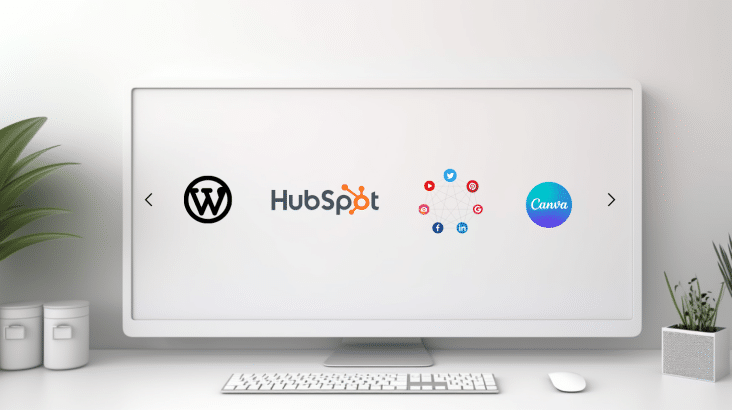Marketing technology and automation tools are changing every day. Research shows that the biggest chunk of a company’s total marketing budget is spent on marketing technology. Do you know what your B2B MarTech stack consists of?
With cloud technology SaaS companies have access to the most current martech tools available, enabling them to build strategic marketing strategies that make them a worthy competitor to industry market leaders.
Marketing automation solutions are essential for any SaaS that wants to accelerate growth. Using their MarTech stack, SaaS companies can efficiently market their software and grow their sales.
But first – What is a B2B MarTech Stack?
Marketers employ a variety of marketing technology – or “MarTech” – tools to improve and supplement their marketing activities across the customer lifecycle journey. MarTech platforms are used to improve corporate collaboration, analyze the effectiveness of marketing efforts, and communicate with customers in a tailored and proactive manner. A MarTech stack refers to a collection of marketing technology tools used by a marketing team to achieve their goals and objectives.
But with so many options, how do you tell the difference between the good and bad martech tools out there? What are the best tools for SaaS marketers? In this article I’ll go over the most essential marketing tools to build the optimal B2B SaaS MarTech stack in 2025.
Content Management Systems (CMS)
Content is at the heart of modern SaaS marketing, whether it’s a vast white paper or a custom microsite, a product pricing page or an instructional blog post. Content without structure, on the other hand, would be chaos. Visitors would have difficulty finding the resources they require, and we would be unable to keep up with an ever-growing archive of internet pages and information. Fortunately, content management systems are available.
Our favorite CMS MarTech: WordPress
Initially launched as a blogging platform in 2003, WordPress has grown into a powerful website builder with unlimited options for customization. WordPress is the most popular CMS and powers over 32% of all websites on the Internet.
Pros:
- User friendly CMS
- Customization
- Plugins for third party integrations
Cons:
- Updates
- Vulnerability
- Speed
Runner-up CMS MarTech: HubSpot
HubSpot’s CMS comes with plenty of features that plugin into its marketing automation tools to create a seamless experience. Whether you just want to build a few landing pages or an entire website, HubSpot’s CMS is a great option.
Pros:
- Easy to use
- Integrates seamlessly with marketing automation tools
- Smart content/Personalization
Cons:
- Limited customization options
- Not all features included with every plan
- No control over backup/recovery
Social Media Marketing (SMM) and Brand Monitoring
Social media can be a powerful tool for reaching out to potential clients, but it takes time and work to see results. That’s where social media marketing tools come in, allowing you to plan content weeks in advance, determine the ideal publication schedule to reach the most people, and analyze your top performing social shares. Many even provide live broadcasts.
Our favorite SMM MarTech: Hootsuite
Hootsuite, a social media automation tool, makes it easy for companies to implement a consistent presence across multiple social platforms like Facebook, Twitter, and Instagram.
Pros:
- Monitor of all your social media from one platform
- Create and manage social media ad campaigns
- See messages from different social media accounts and reply to them directly
Cons:
- Outdated user interface
- Usually a bit of a learning curve
Our favorite Brand Monitoring MarTech: SEMRush
While normally known for SEO, SEMRush’s brand monitoring is actually a really powerful tool that deserves to be mentioned. SEMRush’s brand monitoring tool gives you a feed of brand mentions which you can tag and label as necessary,
Pros:
- No additional cost if you already have a SEMRush account for SEO
- Measures traffic from mentions that contain links
- Integrates with Google Analytics
Cons:
- Not available as separate service
- Limited features compared to some other brand monitoring services
Email Marketing Automation
Email marketing is one of the most effective marketing strategies to have in a B2B MarTech stack. Not many other marketing methods can get your brand directly in front of so many people so quickly as email. Marketing automation can improve your campaign performance by letting you take advantage of segmenting and analytics so you can send your email to the right people at the right time of day for maximum results.
Our Favorite Email Marketing Automation MarTech: HubSpot Marketing Hub
HubSpot Marketing Hub is a comprehensive platform with a range of features all in one place. HubSpot’s email marketing automation platform allows your to create customized email templates with dynamic personalization options that could increase your open rate percentage.
Pros:
- CRM integration included
- Social media management features
Cons:
- Pricing
- Not included in cheaper plans
Runner-Up Email Marketing Automation MarTech: Mailchimp
Mailchimp is one of the most well-known email marketing automation tools with a reputation for having lots of features and being easy to use. Not only does it offer email marketing but you can use it to build targeted ad campaigns, landing pages, and even send postcards.
Pros:
- Easy to use
- Flexible
- Lots of features
Cons:
- Pricing
- Unsend not available on all plans
Paid Advertising and Optimization
A B2B MarTech stack isn’t complete without paid advertising tactics like search engine marketing (SEM), social media ads, and SaaS retargeting campaigns. With new content-centric advertising strategies, paid advertising is no longer the dumpster fire it once was.
Our favorite Paid Advertising and Optimization MarTech: AdEspresso by Hootsuite
AdEspresso allows you to create ads for different platforms as well as monitor them all in one place. Having all of your ads organized in a single panel helps to visually see how each ad is performing compared to the rest.
Pros:
- Easy-to-use ad creation tool
- Ability to create ads for multiple platforms
- View all ad performance in one place
Cons:
- Expensive
- Lack of extra features
Runner-Up Paid Advertising and Optimization MarTech: SpyFu
When it comes to bringing quality traffic to your website, SpyFu is one of the most popular PPC tools available. Offering a whole suite of PPC tool from keyword research to competitor analysis, SpyFu gives you the competitive edge to stay ahead.
Pros:
- Competitive insights
- User-friendly
- Keyword suggestions backed by data
Cons:
- They send a lot of emails
- There is a free version but it’s very limited
- Questionable accuracy
Search Engine Optimization (SEO) and Keyword Research
Google alone processes over 3.5 billion searches every day, and on the battlefields of search engine optimization, entire businesses have been won and lost. Thankfully, search engine marketing (SEM) and keyword research tools cast a light on the mystery of search engine algorithms, providing you with the information you need to better your own search performance.
Our favorite SEO and Keyword Research MarTech: SEMRush
SEMRush is a set of SEO tools that aids websites, blogs, and businesses in increasing their search traffic and performing in-depth research.
Pros:
- Position tracking
- Site audits
- White label reports
Cons:
- Expensive
- Plan limits amount of keywords you can track
Runner-Up SEO and Keyword Research MarTech: Ahrefs
Best known as a backlink analysis tool, Ahrefs has added a ton of new features over the years that have evolved the platform into a comprehensive platform for SEO and keyword research.
Pros:
- Most accurate keyword reporting
- See ranking history
- Cheaper than SEMRush
Cons:
- Limited features compared to some other platforms
Audience Research
As marketers we cannot stress enough the importance of talking to the right audience, in the right place and at the right time. There are various tools that allow you to do this but our favorite is Sparktoro.
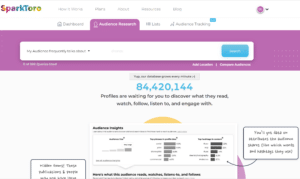
Our favorite audience research tool: Sparktoro
Sparktoro is an audience intelligence tool that helps you understand where your audience spends their time, what things they are interested in, who they follow, what they read, and who they listen to. All this to ultimately help you create your target audience and improve your ROAS.
Pros:
- Audience discovery in seconds
- User friendly
- Outreach opportunities
Cons:
- Local limitations
- Inconsistent in niche industries
Design
Every marketer needs an easy and reliable tool to help with creating templates, social media posts, and images in a simple, fast and affordable manner. Working with the right tools will help you work smarter in 2025 by speeding up the design process while still delivering the highest level designs.
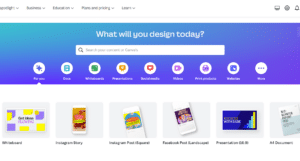
Our favorite design tool: Canva
Canva is a free online graphic design tool, however paid subscriptions will allow you to get access to additional functionality. We use it to create social media posts, logos, images and design our ads.
Pros:
- User-friendly, no previous graphic design experience required
- It offers various templates that can also be customized to your specific needs
- Stock photos that you can use as backgrounds
- Drag and drop editor
- Background remover (for Canva pro plan)
- Free to use (for Canva free plan)
Cons:
- Unable to move designs to other apps
- Free plan is limiting, so we suggest getting a paid subscription for professional use
- Poor product support, mainly via email
Runner-up design tool: Creatopy
Creatopy is an ad design and banners platform, think of it as Canva’s cousin.
Pros:
- User-friendly
- Easy to resize ads for a display campaign
- Stock photos
- Drag and drop editor
- Good product support
Cons:
- No free plan
All-in-One Integrated Marketing Platform
Effective marketing tactics all have one thing in common: they’re all focused on the customer. An ideal customer relationship management system (CRM) is a one-stop shop for visitor data, allowing you to track every interaction with your website visitors as they advance from prospect to user. A CRM shows the customer lifecycle, from the blog posts they read to the emails they open.
Our favorite All-in-One Integrated Marketing Platform: HubSpot
Why? It keeps all of your marketing, sales, and customer service data in one place as well as serving as a marketing automation platform for lead nurturing.
Pros:
- All in one
- Integrations
- Customer Support
Cons:
- Gets expensive fast
Miscellaneous
As you may imagine, the variety of tools available out there that consistently make our lives easier as marketers cannot all be listed within one article without making one want to read the tl;dr version but there are a few more that deserve a special mention in 2025.
Our favorite user experience analytics tool: Mouseflow

Great design is never ideal until you understand user experience and many times what makes sense to your development team, does not make sense to your website visitors. Mouseflow removes the guess work by providing you with information on real user journeys in the form of session replays, heatmaps or funnels to help guide your website optimization and SEO.
Pros:
- User-friendly
- Easy to set up
- Many features that make it a well-rounded user experience tool
- It integrates with various platforms like HubSpot, WordPress
Cons:
- Searching for the right recording may not be very intuitive
- Pricing plan
Our favorite visitor tracking and identification tool: Snitcher
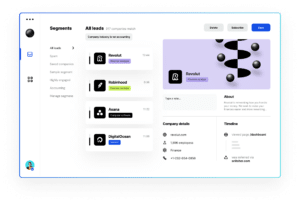
Snitcher helps you effectively capture and analyze website visitor info and ultimately boost your conversions by making sure you are reaching out to the right audience. Marketers may use the platform to learn more about the different industries, companies and personas that they should target in their lead generation campaigns.
Pros:
- Lead capture and segmentation
- Source tracking
- Many filters to help you segment data
- 14-day free trial
Cons:
- Many integrations are through Zapier
Our favorite survey tool: SurveySparrow
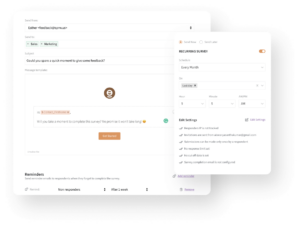
SurveySparrow is more than just a survey tool, they are an omnichannel experience management platform, but in this article we will focus on their survey product.
Pros:
- Intuitive interface
- Design flexibility & customization
- Advanced filters
- Multi-device compatibility
- It integrates with various platforms like HubSpot, Slack, Zendesk
Cons:
- Customer service can be a hit and miss
What’s the Best B2B MarTech Stack for SaaS?
There are many more types of MarTech solutions available on the market that could be beneficial to your SaaS. There are tools to track performance and discover insights in real time, analyzing content and website performance, online video creation and design, sales automation, research platforms, and more.
There is no “one-size-fits-all” B2B MarTech stack. To find the right MarTech stack for your SaaS, you need to develop a SaaS marketing strategy and from there determine the best tools to achieve your marketing goals. Selecting the proper MarTech stack will save you time and make reaching your growth goals much easier.


